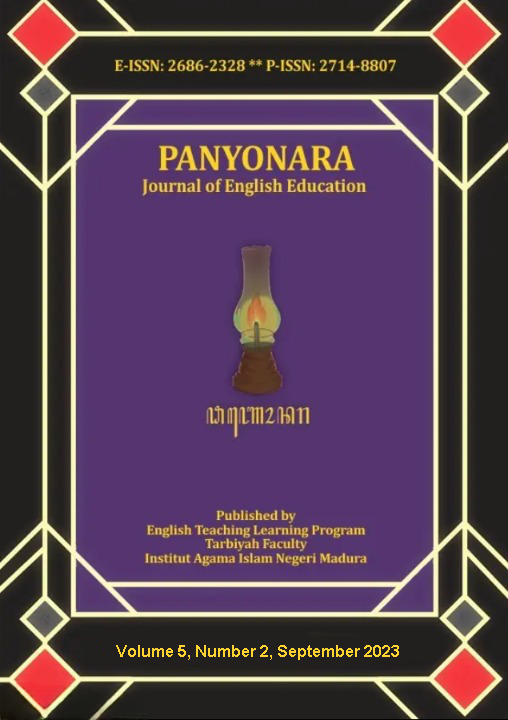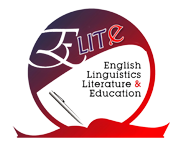The Utilization of Digital Technologies in Learning Speaking Skills: Students’ Problems and Strategies at Islamic School
 Abstract views: 395
,
Abstract views: 395
,
 pdf downloads: 310
pdf downloads: 310
Abstract
Effective communication through speaking is a crucial element in today's globalized world. As technology continues to advance, it is essential to incorporate digital tools to enhance and teach speaking skills. An analysis was conducted to investigate the challenges encountered by students while learning English speaking skills through the utilization of digital technologies at an Islamic High School. The study employed a case
study methodology with questionnaires and in-depth interviews as data-gathering techniques. The outcomes of this research focused on the student's learning process of English speaking skills, the obstacles they encounter, and the strategies employed to optimize the use of digital technology in acquiring those skills. The demand for curriculum updates and teacher training may contribute to this trend. Urgent changes are needed in English learning to emphasize broader skill development instead of memorizing vocabulary and grammar. Educational institutions should consider these findings and improve English language instruction accordingly.
Downloads
References
Abbasova, M., & Mammadova, N. (2019b). The Role of Digital Technology in English Language Teaching in Azerbaijan. International Journal of English Linguistics, 9(2), 364. Retrieved from https://doi.org/10.5539/ijel.v9n2p364
Alhaisoni, E., & Alhaysony, M. (2017). An investigation of Saudi EFL university students’ attitudes towards the use of Google Translate. International Journal of English Language Education, 5(1), 72–82. https://doi.org/10.5296/ijele.v5i1.10696
Angelini, M. L., & García-Carbonell, A. (2019). Developing English speaking skills through simulation-based instruction. Teaching English with Technology, 19(2), 3–20.
Anwas, E., Sugiarti, Y., Permatasari, A., Warsihna, J., Anas, Z., Alhapip, L., Siswanto, H., & Rivalina, R. (2020). Social media usage for enhancing English language skill. https://doi.org/10.3991/ijim.v14i07.11552
Asworo, C. W. (2019). The Analysis of Students’ Difficulties In Speaking English at the Tenth Grade of SMK N 2 Purworejo. Journal of English Education and Teaching, 3(4), 533–538. https://doi.org/10.33369/jeet.3.4.533-538
Aziz, A. A., & Kashinathan, S. (2021). ESL learners’ challenges in speaking English in Malaysian classroom. Development, 10(2), 983–991. http://dx.doi.org/10.6007/IJARPED/v10-i2/10355
Bashori, M., Van Hout, R., Strik, H., & Cucchiarini, C. (2021). Effects of ASR-based websites on EFL learners’ vocabulary, speaking anxiety, and language enjoyment. System, 99, 102496. https://doi.org/10.1016/j.system.2021.102496
Code, J., Ralph, R., & Forde, K. (2020). Pandemic designs for the future: perspectives of technology education teachers during COVID-19. Information and Learning Sciences. https://doi.org/10.1108/ILS-04-2020-0112
Hamsia, W., & Roifah, R. (2023). Using Interactive Media of Spotify in Listening Comprehension For Students in Intensive English Course of Language Center in Universitas Muhammadiyah Surabaya. JEELL (Journal of English Education, Linguistics and Literature) English Departement of STKIP PGRI Jombang, 9(2), 1–11. https://doi.org/10.32682/jeell.v9i2.2865
Handayani, T., & Rabbianty, E. N. (2020). The Insertion of Soft Skill On Students’ Speaking Skill at the Third Semester of TBI Department at STAIN Pamekasan. PANYONARA: Journal of English Education, 2(1), 19–30. https://doi.org/10.19105/panyonara.v2i1.3122
Ikhsaniyah, N. (n.d.). An Analysis of Students’ Speaking Anxiety: Possible Causes and Coping Strategies (Mixed Method Research at the Fourth Semester Students of English Education Department State Islamic University of Syarif Hidayatullah Jakarta). Jakarta: FITK UIN Syarif Hidayatullah Jakarta. https://repository.uinjkt.ac.id/dspace/handle/123456789/59160
Karsenti, T., Kozarenko, O. M., & Skakunova, V. A. (2020). Digital technologies in teaching and learning foreign languages: Pedagogical strategies and teachers’ professional competence. Education and Self Development, 15(3), DOI: 76–88. 10.26907/esd15.3.07
Kustati, M. (2022). Duolingo: An Arabic Speaking Skills’ Learning Platform For Andragogy Education. https://doi.org/10.1155/2022/7090752
Macancela, J. M. (2019). Websites as support tools for learning the English language. Journal of Science and Research: Revista Ciencia E Investigacion, 4(2), 13–20. https://doi.org/10.5281/zenodo.3240648
Mufidah, H. (2017). Factors Affecting The Speaking Difficulties of The Eleventh Grade Hotel Accommodation Students At SMK NEGERI 6 PALEMBANG. [SKRIPSI]. UIN RADEN FATAH PALEMBANG.
Nakatani, Y. (2006). Developing an oral communication strategy inventory. The Modern Language Journal, 90(2), 151–168. https://doi.org/10.1111/j.1540-4781.2006.00390.x
Nurmala, D. (2020). Increasing English Speaking Skills Through Youtube. Jurnal Ilmiah, 16(1). https://doi.org/10.19166/pji.v16i1.1954
Purwandari, S. A. (2022). RELATIONSHIP AMONG STUDENTS‟ EXTRAVERSION PERSONALITY, GRAMMAR KNOWLEDGE, AND ENGLISH-SPEAKING ABILITY (A Correlation Study of Tenth Grade Students at SMA 12 Tangerang Selatan). Jakarta: FITK UIN Syarif Hidayatullah Jakarta.
Sari, S. N., & Aminatun, D. (2021). Students’ Perception on The Use of English Movies To Improve Vocabulary Mastery. Journal of English Language Teaching and Learning, 2(1), 16–22. https://doi.org/10.33365/jeltl.v2i1.757
Statista (2022). Number of Internet and Social Media Users Worldwide as of January 2023. Retrieved April, 2023, from https://www.statista.com/statistics/617136/digital-population-worldwide/
Statista (2022). The Most Spoken Languages Worldwide in 2022. Retrieved April, 2023, from https://www.statista.com/statistics/266808/the-most-spoken-languages-worldwide/
Suryani, I., Suarnajaya, I. W., & Pratiwi, N. P. A. (2020). Investigating the Inhibiting Factors in Speaking English Faced by Senior High School Students in Singaraja. International Journal of Language Education, 4(1), 48–58. https://doi.org/10.26858/ijole.v4i2.10054
Utami, B. N. P. (2021). the Use of Media and Technology To Enhance English Speaking Skill During Pandemic of Covid-19 Era. International Conference on Education of Suryakancana (IConnects Proceedings).
Yaniafari, R. P., Nufus, F. Z., & Rahmanigtyas, H. (2023). Developing CISAR (Two-Mode Chain Story Cards) to Facilitate Hybrid Learning. PANYONARA: Journal of English Education, 5(1), 41–63. https://doi.org/10.19105/panyonara.v5i1.8234
Yendra, B. R. (2018). An Analysis of Students’ Problems in Mastering Speaking Skill Faced By The First Semester of The Twelfth Grade At SMAN 3 KOTABUMI LAMPUNG UTARA IN THE ACADEMIC YEAR OF 2017/2018. UIN Raden Intan Lampung.
The journal uses an Open Access policy under a Creative Commons Attribution-NonCommercial 4.0 International License. Authors who publish with this journal agree to the following terms:
- Authors retain copyright and grant the journal right of first publication with the work simultaneously licensed under a Creative Commons Attribution License that allows others to share the work with an acknowledgment of the work's authorship and initial publication in this journal.
- Authors are able to enter into separate, additional contractual arrangements for the non-exclusive distribution of the journal's published version of the work (e.g., post it to an institutional repository or publish it in a book), with an acknowledgment of its initial publication in this journal.
- Authors are permitted and encouraged to post their work online (e.g., in institutional repositories or on their website) prior to and during the submission process, as it can lead to productive exchanges, as well as earlier and greater citation of published work.
















